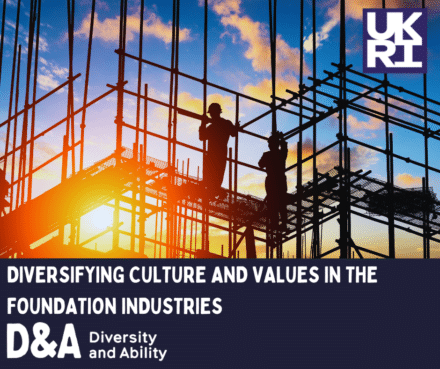“If it’s not inclusive, it’s not innovative; diversifying culture and values in The Foundation Industries”
8th August 2023 by Ellie Thompson

In an industry that prides itself on being ever-evolving, how can we ensure the foundation Industries evolve their inclusion as they evolve their innovations?
Diversity and Ability (D&A) have partnered with UK Research and Innovation (UKRI) to conduct a research report highlighting the urgent need for cultural transformation and inclusive practice within foundation industry businesses.
What are The Foundation Industries?
The Foundation Industries are pioneering in the UK manufacturing and construction sectors. They include cement, metals, glass, paper, ceramics and chemicals.
Their very existence is down to a history of groundbreaking innovations that have created the industries as we know them today!
But progress is bound to halt unless the innovative approach to materials is matched with an innovative, solution-focused approach to inclusion.
Why is inclusion so important?
Diversity of thought fosters innovation
“Diversity isn’t just nice to have. Diversity propels your business and sets you apart from the competition,” Says Emma Turner, Workplace Partnerships Lead at Diversity and Ability. “With diversity comes diversity of thought, which breeds innovation, and with innovation comes new markets, productivity, and employees who thrive in an environment where they know they are truly valued and appreciated.”
Foundation Industries businesses may be behind in recognising the innovations that come with an inclusive business that welcomes a wide range of talent. This is despite the growing evidence that diversity and inclusion pave the way for success; one of the top reasons to increase diversity among foundation industry companies is to improve “the capacity for innovation and creativity” (Royal Academy of Engineering, 2015).
Access a new pool of talent
With 79% of foundation industry organisations reporting that they’re experiencing skills shortages (Royal Academy of Engineering, 2015), businesses can’t afford to be actively excluding a huge potential talent pool.
Take disabled people, for example. An estimated one in five people in the UK are disabled (DWP, 2022). And, with 82% of disabled candidates sharing that their most significant barrier to employment was finding an employer that is disability-friendly, evidence suggests that businesses are losing out on a diverse talent pool by failing to make their workplaces more inclusive.
Why aren’t the Foundation Industries prioritising inclusion?
An outdated idea of hiring the ‘right person’
Industry culture often focuses on attracting the ‘right people’ (ERC, 2021). It’s believed that this is based on merit alone; however, research shows that a meritocratic practice is steeped in bias (Deloitte, 2019).
Companies may be focused on the idea of wanting to fill vacancies on a ‘like for like’ basis (ERC, 2021), but in an environment which is dominated by male employees, this creates a vicious cycle of homogeneity. Our research similarly evidenced the notion of a homogenous culture. Both individual employee respondents shared that they didn’t feel they could be their whole or authentic selves within their respective workplaces. What’s more, each highlighted a lack of inclusive behaviour, with one commenting on “those who do not respect others” and the other specifically calling out “discrimination towards those with a disability.”
Our recommendation? Embed an inclusive, accessible and intersectional hiring process that opens up the workforce to welcome all applicants.
The need for wider cultural buy-in
We asked each respondent if their workplace had demonstrated a commitment to equity, diversity and inclusion (EDI). Although responses were mixed, the commonality that united them was an acknowledgement that the industry as a whole lacks a consistent commitment to EDI.
A separate investigation conducted by D&A also highlighted a lack of consistency, with both businesses we worked with sharing how some managers demonstrated an investment in EDI practices and others lacked engagement.
Without a cross-industry commitment to EDI, employees who fall outside of the dominant identity group may feel unsure about whether they will be truly welcomed and included in an environment.
Our recommendation? Adopt a dual-pronged approach to culture change that includes both leadership-level consultancy and organisation-wide training and support.
Conclusion
Our sample size was small, so we can’t conclude any trends on the basis of this research alone. But we don’t have to; the findings fit in with the ever-increasing body of evidence from across the industry.
Inclusion and diversity are yet to be prioritised, and this failure to prioritise is having tangible impacts on the sector’s ability to recruit, retain and innovate. It’s time to act with urgency to ensure the Foundation Industries don’t get left behind.


